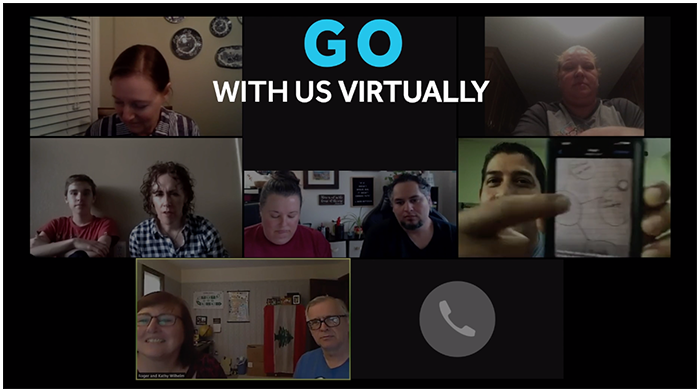
Posted on Dec 16, 2020 in Mission Moment, Uncategorized |

The 1980 Winter Olympic Games in Lake Placid, NY served as the backdrop for one of the most famous broadcasting calls in sports history. A rag-tag collection of amateurs made up the USA hockey team as they faced off against the best team in the world: the Soviet Union. Team USA seemingly had no chance going into the match. Yet as the final seconds ticked off the clock, the amateurs from the US had defeated the Soviets 4-3. Al Michaels famously asked his audience this unforgettable question: “Do you believe in miracles?!?”
This month we wrap up our four-part series on Jesus’ multiplication teaching from the feeding of the five thousand in Matthew 14. We believe that God is calling us to multiply disciples and churches and we’ve paused to learn all that we can from Jesus’ miracle of multiplication. So far, we established that multiplication starts with followers of Jesus being motivated with a burden for others; responding to Jesus’ call to do something about it by bringing Jesus what we have; and being obedient to Jesus’ command no matter how ridiculous it may seem.

Posted on Nov 15, 2020 in Mission, Mission Moment |

It is our belief that God is calling us to multiply disciples and churches. But how can we participate in God’s multiplication activity in the world today? This is part three in a series on Jesus’ multiplication teaching from the most remarkable multiplication story in human history: the feeding of the five thousand in Matthew 14.
In the first two articles, we established that multiplication starts with you and me, followers of Jesus, being motivated with a burden for others and then responding to Jesus’ call to do something about it by bringing Jesus what we have, no matter how meager or inadequate our resources may seem. According to Matthew, when the disciples saw the hungry crowds, Jesus commanded them, “You give them something to eat.” “But we only have five loaves and two fish,” the disciples responded. And Jesus replied, “Bring them here to me.”

Posted on Oct 15, 2020 in Mission Moment |

As you likely know, multiplication is a key word that we use in LCMC to illuminate what we believe God is calling us to do with disciples and churches. Last month I began a four-part series on what Jesus has to teach us regarding multiplication from one of the most remarkable multiplication stories in human history: the feeding of the five thousand as recorded in Matthew 14.
We began learning the lesson that multiplication starts with you and me, followers of Jesus, being motivated with a burden for others. When the disciples saw the hungry crowds, Jesus commanded them, “You give them something to eat.” This month, we pick-up right where we left off: Exasperated, the disciples respond to Jesus, “But we only have five loaves and two fish!” In other words, the disciples took stock of all of the food resources that they had at their disposal and determined that it was not enough.

Posted on Sep 15, 2020 in Mission Moment |

Recently, I received an email from one of our pastors that challenged my thinking in a good way. Here in the Texas District, we talk a lot about our mission to Multiply Disciples and Churches. He affirmed that we indeed should be talking about multiplication, but questioned whether we might be missing the heart for the strategy. What this pastor meant is that we can have the best of intentions that are indeed consistent with God’s desire and plan the best strategies for how this can happen, but if people (insert YOU and ME) are not captivated in our hearts to share the Gospel, multiplication will never happen.
I have to agree: Multiplication can only ever begin when followers of Jesus (again, insert YOU and ME) are moved in our hearts to share Jesus with others in ways that are natural and happen regularly as we go through our everyday lives. We are sorely mistaken if we wait around for someone else to do this multiplication work.

Posted on Aug 15, 2020 in Mission Moment |

2020 has been one heck of a year. Yes, I know, “heck” is just a polite way of saying “H-E-double hockey sticks,” but it seems to accurately describe how many have felt about this year which has been marked by global pandemic, unprecedented job loss, economic uncertainty, and racial, political, and social division. The church and the Gospel mission seem increasingly marginalized–shoved aside as our nation and world endure this cultural earthquake and its devastating aftershocks.
When the earth stops quaking and we emerge from our places of refuge to take stock of the destruction and survey the landscape which is forever changed by the seismic shifts that have taken place, we will undoubtedly cry out to God in despair and lamentation for the losses sustained and the suffering we see all around. Yet in the midst of this cultural upheaval, I believe God is at work and is calling the church to continue his restorative work. With the earth still quaking the and the world still shaking, the mission of Jesus in the world draws the faithful to emerge out of hiding and into the chaos to do justice, love mercy, and walk humbly with our God.

Posted on Jul 20, 2020 in Mission Moment, Uncategorized |

Covid-19 has taken so much from us. So many of our normal routines have been disrupted and cultural norms have been turned upside down. Businesses, churches, schools, civic leaders and servants, healthcare providers and almost every family and household have all had to learn how to adapt. Global mission activity has also been deeply impacted.
Short-term mission trips have been a powerful tool to not only do great, kingdom-building ministry around the world, but also to meaningfully engage everyday followers of Jesus in the mission of Jesus while opening their eyes to mission opportunities around them in their own communities. But how can these Jesus’ followers go in a Covid-19 era of travel bans? Recently, a member of one of our churches shared a solution for the countless now cancelled short-term mission trips that had been planned.

Posted on Jul 2, 2020 in Mission, Mission Moment, Uncategorized |

Lutheran Congregations in Mission for Christ is in the midst of a significant transition: Our Board of Trustees is in the final stages of identifying the next Service Coordinator to lead our church body as Mark Vander Tuig retires after ten years in that role. As a part of the transition, leaders from across the association gathered for an assessment guided by Bob Logan of Logan Leadership. In this assessment, several keys for the future of our association were identified.
For me, the most significant takeaway was our need to develop our “missional accountability.” What does this mean? As an association, we have four core values: Free in Christ, Accountable to one another, Rooted in the Scriptures and the Lutheran Confessions, and Fulfilling Christ’s Great Commission to go and make disciples. While each of the four core values are important, the last identifies our purpose. And what Bob Logan helped us recognize is that while we hold one another accountable to Scripture, theology and morality, we have had little to no accountability for our mission to go and make disciples.

Posted on May 20, 2020 in Mission, Mission Moment, Uncategorized |

The Day of Pentecost is upon us this year on May 31. Each year we pause to celebrate the birthday of the church and the day when the Holy Spirit was made manifest in powerful ways in and through the followers of Jesus as recounted in the second chapter of Acts. It is a day to remember that the Holy Spirit continues to work in and through the followers of Jesus today in small and mighty ways and to pray for God to revive and renew the Church through the power and presence of the Holy Spirit. It is indeed my prayer that the Day of Pentecost is a beautiful celebration and that Holy Spirit once again moves with power in and through followers of Jesus the world over.
But perhaps even more important than the activity on the Day of Pentecost is what happens next. In Acts 2:42-47 we read about what the followers of Jesus were up to after this glorious day: “They devoted themselves to the apostles’ teaching, to the fellowship, to the breaking of bread, and to prayer. … They sold their possessions and property and distributed the proceeds to all, as any had need. Every day they devoted themselves to meeting together in the temple, and broke bread from house to house. They ate their food with joyful and sincere hearts, praising God and enjoying the favor of all the people. Every day the Lord added to their number those who were being saved.”

Posted on Apr 19, 2020 in Mission Moment, Uncategorized |

A colleague recently sent me a thought-provoking article entitled “Leading Beyond the Blizzard” by Andy Crouch, Kurt Keilhacker, and Dave Blanchard. The article posed important questions for businesses and organizations to consider in light of the COVID-19 Pandemic. The authors suppose that this crisis that we are currently in will significantly reshape culture like nothing anyone alive today has seen before. They forecast that we are not in a blizzard (like many first thought) during which time we hunker down to wait out the passing storm, nor is it a bleak extended season of winter in which we long for spring to eventually arrive, but rather that COVID-19 is perhaps ushering in the beginning of an ice age that could endure for years to come.
Whether or not the result of this crisis is a long winter or the beginning of an ice age, the authors suggest that organizations, including the church, need to redefine our business as COVID-19 has shut us down: “If your nonprofit organization depends on gathering people in medium or large groups – and it is truly daunting to consider how many do, whether for fundraising banquets, afterschool programs, or in the case of churches for corporate worship – you are not in the same business today. And this is not just a blizzard that you can wait out.”

Posted on Mar 20, 2020 in Mission Moment |

When I have the opportunity to preach, I enjoy engaging the congregation. Sometimes, I’ll bring along a beach ball and play a game. I’ll pass the beach ball around the sanctuary and whoever catches it completes the sentence, “The church is _________.” I find this to be a fun way to get to hear all sorts of thoughts or images about the church before launching into my sermon.
I’d like to share with you a new way I’ve begun to think about the church: The church is more than a Sunday gathering. As the COVID-19 Pandemic systematically shuts down life in America as we know it, we are quickly having to adjust ministry in response to this new reality. I understand the frustrations that so many have, especially in remote small towns and rural places that feel so far removed from the problems of the more densely populated urban and suburban cities. You may be asking, “Why do we have to adjust our ministry when we feel safe?”



















